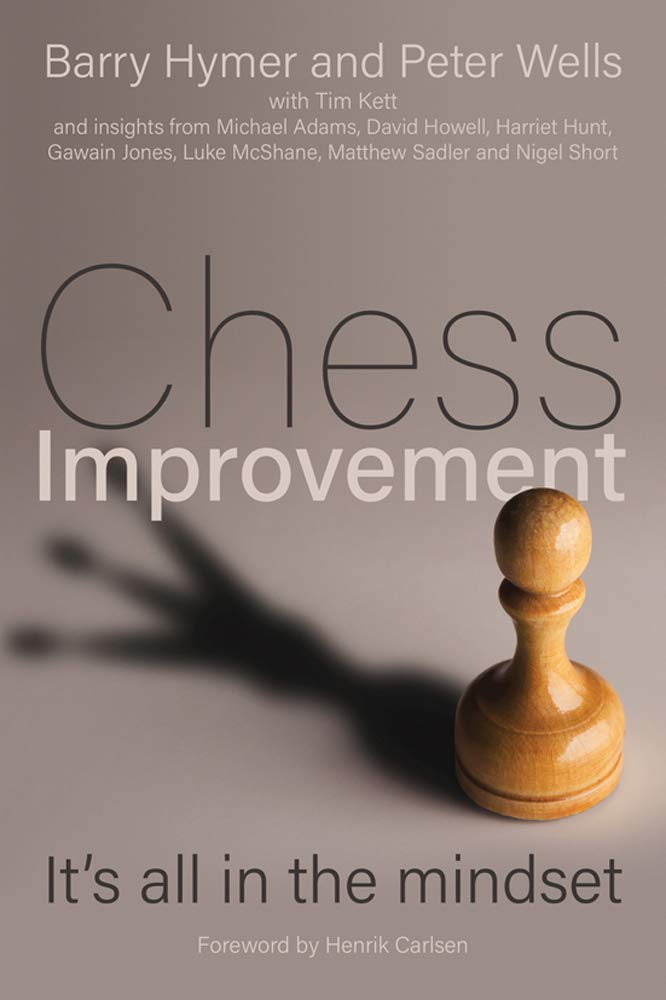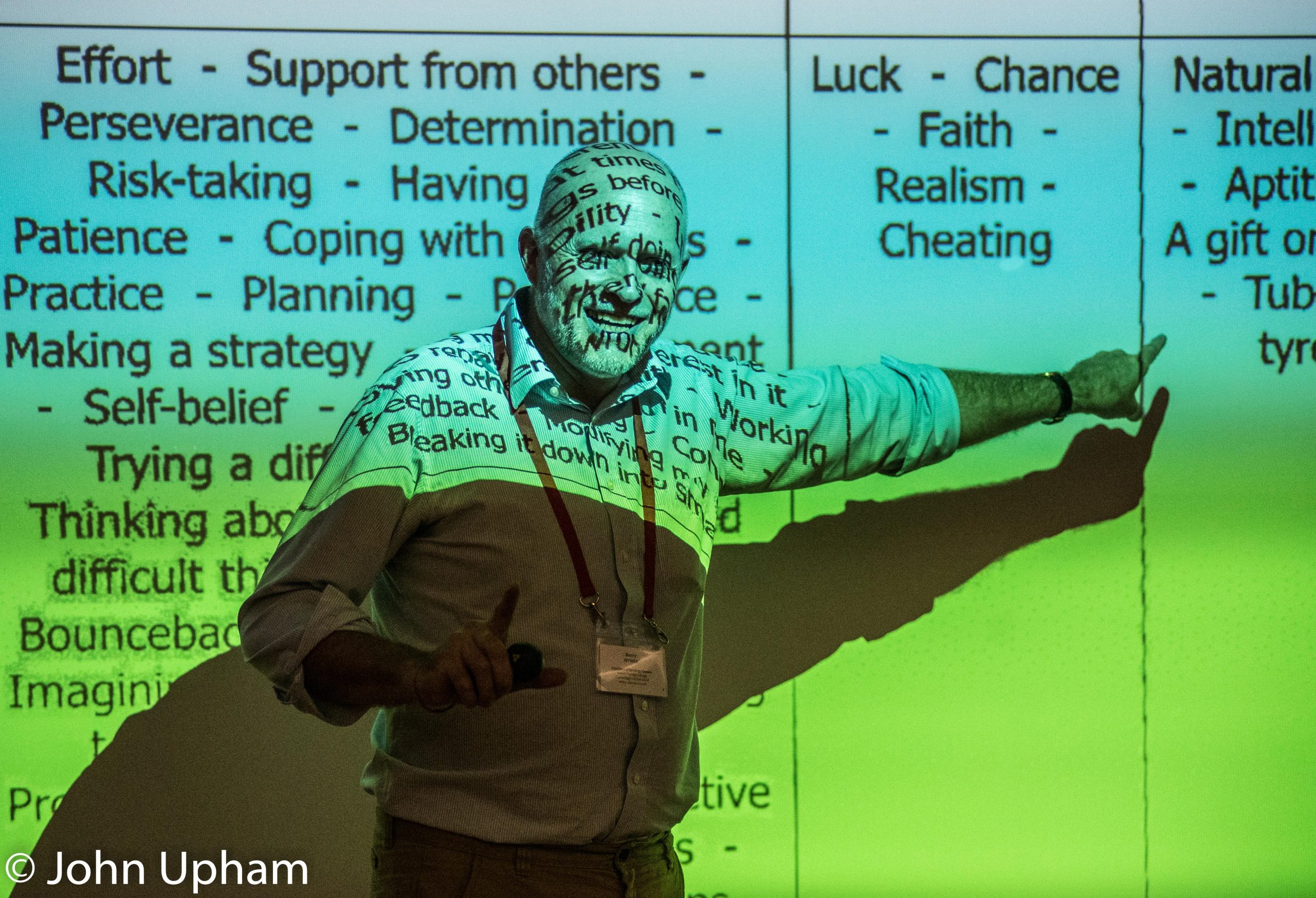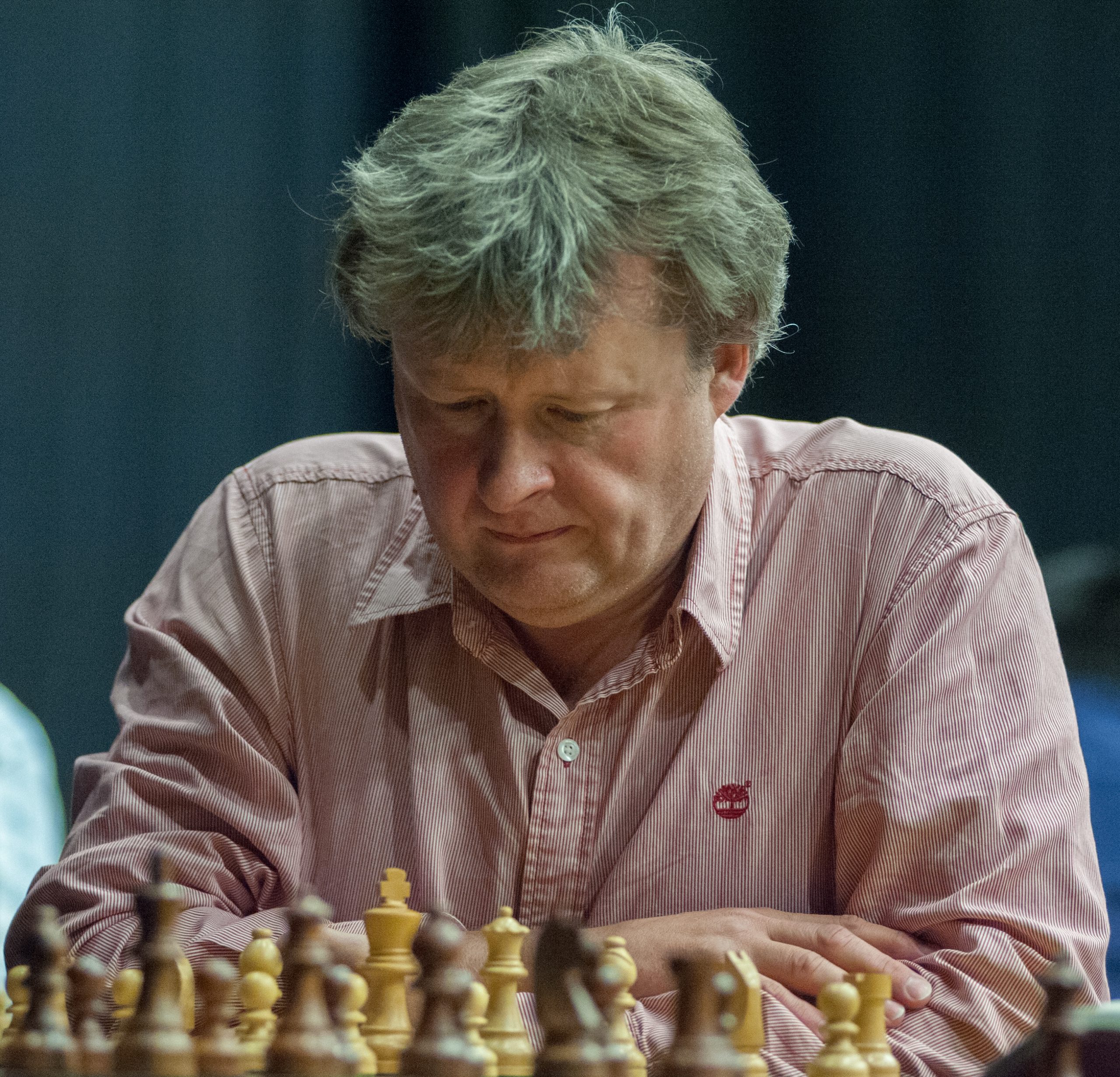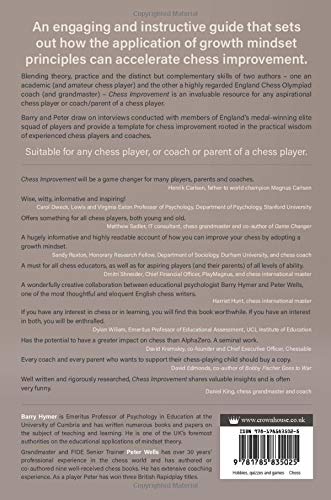Chess Improvement: It’s all in the mindset : Barry Hymer and Peter Wells

From the publisher :
“Written by Barry Hymer and Peter Wells, Chess Improvement: It’s all in the mindset is an engaging and instructive guide that sets out how the application of growth mindset principles can accelerate chess improvement.
With Tim Kett and insights from Michael Adams, David Howell, Harriet Hunt, Gawain Jones, Luke McShane, Matthew Sadler and Nigel Short.
Foreword by Henrik Carlsen, father of world champion Magnus Carlsen.
Twenty-first-century knowledge about skills development and expertise requires us to keep such mystical notions as fixed ‘talent’ in perspective, and to emphasise instead the dynamic and malleable nature of these concepts.
Nowhere is this more apparent than in chess, where many gifted players fall prey to plausible but self-defeating beliefs and practices – and thereby fail to achieve the levels their ‘natural’ abilities predicted. Happily, however, the reverse can be true too; through learned dispositions such as grit, risk-taking, strategic thinking and a capacity for sheer hard work, players of apparently modest abilities can achieve impressive results.
Blending theory, practice and the distinct but complementary skills of two authors – one an academic (and amateur chess player) and the other a highly regarded England Chess Olympiad coach (and grandmaster) – Chess Improvement is an invaluable resource for any aspirational chess player or coach/parent of a chess player.
Barry and Peter draw on interviews conducted with members of England’s medal-winning elite squad of players and provide a template for chess improvement rooted in the practical wisdom of experienced chess players and coaches.
They also include practical illustrative descriptions from the games and chess careers of both developing and leading players, and pull together themes and suggestions in a way which encourages readers to create their own trajectories for chess improvement.”


If you visit the Chess Palace at the end of my garden you’ll find quite a few chess books and magazines. But if you visit my office and look at the shelves above my desk you’ll find a lot of books on education, child development, psychology, parenting, conditions such as autism and ADHD. There are not many books which would fit equally well in both my office and the Chess Palace, but this is one. Perhaps I need a second copy.
The authors are a well matched team. Barry Hymer is a distinguished academic specialising in educational psychology, and also a strong amateur chess player. Peter Wells is an experienced grandmaster and élite level coach with an interest in psychology. Tim Kett, another strong player and experienced chess coach, also made a significant contribution to the book.
England’s six strongest players, Mickey Adams, Nigel Short, Gawain Jones, David Howell, Luke McShane and Matthew Sadler, along with one of our top woman players, Harriet Hunt, were interviewed for the book. I wonder if Jovanka Houska was also invited. Henrik Carlsen, Magnus’s father, agreed to provide the preface.
The main message of the book, which draws heavily on the work of Carol Dweck and other researchers, is that having a growth rather than a fixed mindset is a major factor in chess improvement. If you see yourself as someone who can grow as a player you will do so, but defining yourself by your current rating will leave you stuck.
Chapter 1 introduces the concept of mindset theory and how it applies to chess. The authors then provide us with their chess mindset biographies: Hymer tells of his unfulfilled early promise while Wells is brutally honest about what he sees as underachievement and psychological failings.
The remaining chapters start with Hymer giving the theoretical and research background, followed by Wells looking at the same subject from a practical point of view. Finally, there are some very helpful guidelines for parents and coaches, for which Kett was partly responsible.
Chapter 2 concerns Motivation. Hymer explains the difference between extrinsic (prizes, rewards) and intrinsic (from the game itself) motivation, explaining that intrinsic motivation is, by and large, more likely to lead to improvement. I’d add here that many competitions for young children are very big on extrinsic motivation, from fluffy mascots to outsize trophies.
Wells then provides us with the views of his interviewees, all of whom, as you would expect, just enjoy playing chess. Several of them related that they really enjoyed reading chess books when they were younger, and some also enjoyed the beauty of endgame studies. His points are illustrated by examples from play.
I was particularly interested to see a game with which I was very familiar: played by Luke McShane in the 1992 World U10 Championship. I knew his opponent as Aronov: I hadn’t realised until now that this was Aronian, who was at that time using the Russian version of his surname.
Wells was impressed by the sophistication of McShane’s play after a poor opening and suggested that he had already studied Nimzowitsch. After White’s 7th move he speculated that ‘Luke was just making it up’.
I have a story about this game which can now be told for the first time. Before the tournament Luke’s father sent me copies of his recent scoresheets and I provided some feedback. Luke had played this poor variation before and, as I was playing the Schliemann myself at the time and had won several games on the black side of this line, I was able to identify the problem. I suggested to his father that he needed something different against the Schliemann in case it came up in the tournament, but my advice was ignored.
It was all the more amusing, then, to turn to Chapter 7 and read: “Sometimes, as with Richard James, the very thoughtful and experienced influence behind Richmond Junior Chess Club’s involvement in Luke’s early career, the advice was directed to his father, reinforcing Rod McShane’s already impressively sound instincts as to how to help his son.”
Chapter 3 is about Challenge and Feedback. Should you challenge yourself by playing in stronger tournaments where you might not score many points but you’ll learn from playing stronger opponents? Or should you play in weaker tournaments where you hope to win most of your games and perhaps receive a reward, financial or otherwise, for doing so? What is the best way for chess teachers to give feedback to their students?
In general, mindset theory suggests you should play up, but it doesn’t always work out. Nigel Short recalls playing in the Phillips & Drew Tournament in 1982 where he was rather out of his depth, scoring 3½/13. “Even at the time, concerns were widely expressed that Nigel had been launched into a level for which he was just not ready, but he is now adamant that there were simply no adults around to see the danger in advance. Nigel himself is in no doubt that this did tangible damage to his confidence and appetite to the game and thereby impeded his development for some time after – that was ‘not a learning experience, that was trauma’. ” Of course different players will respond differently. Luke, for example, has no such memories. But the general message here is to mix challenging and confidence boosting events.
On the subject of feedback, specific praise and constructive criticism are valued, but general praise can be less than useful. Harriet Hunt is interesting here on girls in chess. “She felt subjected to much gender-grounded feedback, some of it critical for sure, but also large amounts of condescension in the form of ‘praise and patting on the head’. … More generally, she shares my conviction that girls in chess tend to be held back by excessive adulation for relatively modest achievements in a way that can damage their motivation.”
I particularly liked two of the pieces of advice for parents and coaches at the end of this chapter: “Discourage children from counting their trophies.” and “When they finish a tournament game, don’t ask the result!”. You might have to think about both of them.
Chapter 4 looks at “the right kind of effort: making practice purposeful”. Most of us are familiar with Ericsson’s ‘10,000 hour rule’, but what do we mean by ‘deliberate practice’ and how does it apply to chess? In fact the interviewees, by and large, approached chess in a rather less structured way than might be expected. Wells then talks at length about various aspects of studying openings before moving onto tactics and endings.
The important subject of Failure is tackled in Chapter 5. All chess players lose games from time to time. All tournament players will experience bad tournaments. Different players will deal with this in different ways.
Hymer reached this position with black in Round 4 of the 2018 Blackpool Open. It’s an easy win: all he has to do is play fxg5 (or f5) to fix the king-side pawns, march his king round to the queen side and create a passed pawn. But instead he played the immediate and catastrophic Ke8, and after the reply f5 had to resign. “I withdrew from the tournament”, he admitted, “and headed home, seriously contemplating another three-decade separation from chess”.
Wells then addresses the issues of how to cope when something goes wrong in your game, how to respond to a loss in your next game, and how to reflect on your defeats before the next tournament.
Chapter 6 brings us on to Metacognition – thinking about thinking. Being aware of your thought processes, and, beyond that, being able to regulate them, is not only important in terms of chess improvement but is a vital life skill. After Barry Hymer’s theoretical background, Peter Wells considers the effect of metacognition on chess style, and whether it’s preferable to develop a ‘universal’ style or to focus on your specific strengths and preferences. Of particular interest here is a section devoted to the role of style in Matthew Sadler’s professional chess career.
Finally, Chapter 7 is about Cooperation. Hymer explains the latest research into the advantages of working together within small groups. Then Wells looks at the practical side of cooperation, emphasising the importance of parents, mentors and coaches for younger players, and then writing about the camaraderie and sportsmanship which exists at all levels of chess.
This is from the game Wells – Priehoda (Cappelle-la-Grande Open 1992) where White played the winning combination 25. Nb5+ Kc8 26. Rxc6+ Rxc6 27. Nxa7+ Kc7 28. Rxd7+ Kxd7 29. Nxc6 Ra8 30. a6 Kc7 31. Nb4 1-0
The loser responded not only with generous words but by submitting the combination to Chess Informant: a sporting gesture indeed.
By now we’ve reached the epilogue and, having learnt a lot of interesting and helpful information about mindset theory, it’s rather perturbing to read in a footnote: “(John) Hattie attributes having a growth rather than a fixed mindset to a modest effect size of 0.19 in recent presentations, and the Education Endowment Foundation has failed in their research to find a compelling reason to do mindset interventions in schools and classrooms.”.
So, have we all been wasting our time? Not at all, claims Hymer: schools tend to have ‘superficial or muddled understandings’. Yes, I can understand that. My impression is that some schools tend to jump on the latest education bandwagon without a lot of thought. A decade or so ago it was VAK (look it up!), then it was Mindsets: for some it’s Chess on the Curriculum.
I was already familiar with the concept and had read Carol Dweck’s book on the subject. I was also aware that the whole idea had been criticised in some quarters: here, for instance (with my apologies for a rather rude word), is respected education author and blogger David Didau’s take on mindset theory. There’s a lot more on both sides of the argument online if you care to look. You pay your money and you take your choice.
My view, as an interested and reasonably well informed layman, is that Mindset Theory has its uses in certain situations, but needs to be treated with discretion. Hymer seems to think that almost anyone could become a strong player given sufficient time and the right mindset. I don’t think I agree. Estimates for the heritability of IQ range from something like 50% to 80% so it seems reasonable to assume that chess ability (which is in itself a macro-skill comprising a lot of micro-skills) is also in part heritable. His views – and this may explain his promotion of Mindset Theory – are a lot closer to the nurture end of the nature-nurture spectrum than mine.
This leads into my other problem with the book. We hear a lot of grandmaster voices, all of whom have interesting and sometimes contradictory things to say. I found the contributions of Matthew Sadler and Luke McShane particularly valuable: it may not be a coincidence that they are perhaps the two strongest amateur chess players in the world. But I also wanted to hear the voices of lower rated players who are interested in chess improvement. Ben Johnson’s popular Perpetual Chess Podcast, for example, often features adult improvers. Hearing from ambitious teenagers might also have been valuable, and it would have been good to hear more than one female voice. I’m not sure how helpful this fixation with top grandmasters really is: one issue for me is that many of the games and positions Wells uses to make his points were rather too difficult to be personally useful to this 1900 strength player.
In spite of my reservations I’d still offer a strong recommendation for this book, which takes a fresh, even if sometimes controversial, approach to chess improvement. It’s well written, well structured and often very funny. On almost every page you’ll find nuggets of wisdom which will, at the very least, make you stop and think.
There are, of course, very many books on the market which will show you how to play good moves, but there are very few that consider what’s happening in both your mind and your brain when you play. An understanding of these issues will improve both your rating and your enjoyment of chess. The book will also be especially valuable – perhaps essential reading – for chess teachers and parents.
The publishers, Crown House, may be a new name to you. They specialise in books on education and self help, and, as their logo is a chess queen, it seems only right that they should branch out into our favourite game. This book is already high up in the Amazon best seller list for chess books, so perhaps it’s reaching an audience away from the usual chess community. There’s certainly scope for more books in the field of chess psychology and education: we at British Chess News hope this will be the first of many books from this publisher.
Richard James, Twickenham 21st December 2020

Book Details :
- Paperback : 352 pages
- Publisher: Crown House Publishing (16 Oct. 2020)
- Language: English
- ISBN-10: 1785835025
- ISBN-13: 978-1785835025
- Product Dimensions : 15.75 x 2.29 x 23.37 cm
Official web site of Crown House Publishing


“Nigel Short recalls playing in the Phillips & Drew Tournament in 1982 where he was rather out of his depth…” – I might be wrong, but I thought this was the 1980 tournament.